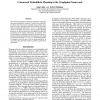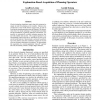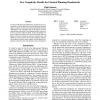108
Voted
AIPS
2006
15 years 3 months ago
2006
We investigate the problem of temporal planning with concurrent actions having stochastic durations, especially in the context of extended-state-space based planners. The problem ...
119
Voted
AIPS
2006
15 years 3 months ago
2006
We consider the problem of planning optimally in potentially concurrent probabilistic domains: actions have probabilistic effects and may execute in parallel under certain conditi...
AIPS
2006
15 years 3 months ago
2006
We present a new approach to optimal rectangle packing, an NP-complete problem that can be used to model many simple scheduling tasks. Recent attempts at incorporating artificial ...
114
Voted
AIPS
2006
15 years 3 months ago
2006
Planning is often not a one-shot task because either the world or the agent's knowledge of the world changes. In this paper, we introduce a new principle that can be used to ...
109
click to vote
AIPS
2006
15 years 3 months ago
2006
In AI Planning, as well as Verification, a successful method is to compile the application into boolean satisfiability (SAT), and solve it with state-of-the-art DPLL-based procedu...
103
click to vote
AIPS
2006
15 years 3 months ago
2006
We view dynamic scheduling as a sequential decision problem. Firstly, we introduce a generalized planning operator, the stochastic task model (STM), which predicts the effects of ...
AIPS
2006
15 years 3 months ago
2006
103
Voted
AIPS
2006
15 years 3 months ago
2006
Classical planning algorithms require that their operators be simple in order for planning to be tractable. However, the complexities of real world domains suggest that, in order ...
AIPS
2006
15 years 3 months ago
2006
We investigate a task insertion heuristic for oversubscribed scheduling problems, max-availability, that uses a simple estimate of resource contention to assign tasks to intervals...
101
Voted
AIPS
2006
15 years 3 months ago
2006
The 3rd and 4th International Planning Competitions have enriched the set of benchmarks for classical propositional planning by a number of novel and interesting planning domains....




